Brian Hofmeister has tried organic church and found it difficult.

He writes about his experiences in a report in
Christianity Today - Leadership. Brian's conclusion is that leading organic church was just too onerous, and was not achievable without some degree of professional input.
However, this has not been my experience, nor that of many others. And I don't believe it was the experience of the early church either. There's little evidence of paid leadership in the New Testament.
So what went wrong for Brian and the people he met with? To answer that we need to go right back to define what is and is not organic church. The word 'organic' implies an organism, whereas much of our experience of church comes from organisations. An organisation usually has a top-down management structure and a hierarchical authority structure. Something which is organic begins from a seed and grows until it reaches maturity and produces more seeds which grow in their turn.
In this way, one tiny seed may produce not just a tree, but an entire forest. It takes a certain amount of time, but it speeds up dramatically with each generation and will eventually fill the space available. Trees and forests
can be managed, but they don't have to be. There were very successful forests in many parts of the world before human explorers arrrived to manage them!
I think that Brian simply tried too hard to manage and guide and educate and persuade. But that's not organic. The seed that germinates and grows amongst a small group of people is the expectation that Yahshua himself will do the managing, guiding, educating, and persuading. He said, 'I will build my church.' And he really meant it! He is the only one who truly knows how to do it.
Church is a community of people who love one another because Christ has first loved
them. When we come together to meet it's just the tip of a giant, hidden core of fellowship and community. When we meet, Yahshua is there at the centre. He is with us because we are his and he loves to bless us and guide us. But he's also with us day by day as we live our lives, he is with us in defeat and in victory, in sorrow and in joy.
A group of new believers, if they focus on Jesus, will help one another along the road to maturity. The wiser and more mature will look out for the others. There
will be problems, but rather than training programmes and theological studies the believers need to discover how to be disciples. They need to be walking with the Lord, listening to what he says and watching what he does. Reading the Bible together will provide a lot of useful guidance. Eating together when possible, helping one another with practical things, and having good, family fun together will help too. Encouraging one another, praying for one another, all these things help to build community.
But the key is listening to the Lord and doing what he says. Out of this will come mission, church growth, and all the rest.
Brian tried an alternative model of church and found it wanting. But it wasn't really organic church. My advice to him would be try again but to do a whole lot less while expecting Yahshua to do a whole lot more!
For some practical advice, browse through the 'Useful links' in the right hand sidebar, these will lead to other useful material - books, mp3s, DVDs, videos and more. But above all pray and ask Jesus himself to guide you, he won't let you down.
 but instead we are well on the way to wrecking it.
but instead we are well on the way to wrecking it.





